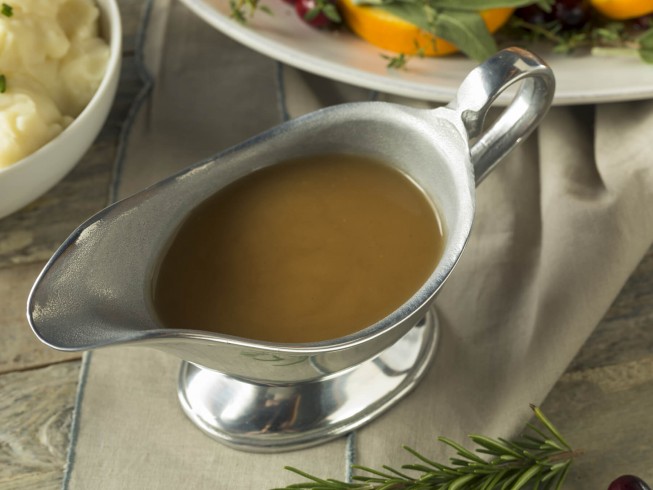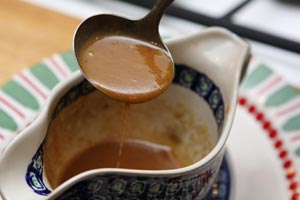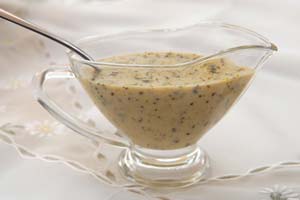It may look like a sad little package shoved in the back of your freezer, but frozen spinach actually has a lot of culinary uses (and some may surprise you).

This flavorful gravy made from roasted turkey wings can be made up to a week in advance (longer if you freeze the gravy). Perfect time saver over the holidays.

3 pounds turkey wings
2 medium onions, peeled & quartered
1 cup water
8 cups chicken broth
3/4 cup chopped carrot
1/2 teaspoon dried thyme
3/4 cup all-purpose flour
2 tablespoons butter
1/2 teaspoon freshly ground black pepper
Preheat the oven to 400 degrees F.
Place the turkey wings in a single layer in a large roasting pan. Place the onions on top of the wings. Place the pan in the oven. Bake at 400 degrees for 1 hour or until the wings are browned.
Remove the wings and onions from the roasting pan and place in a large saucepan. Add the water to the roasting pan and stir to loosen any cooked on bits. Transfer the liquid to the saucepan and add 1 cup of the chicken broth, the carrots, and thyme. Bring to a boil over medium-high heat. Reduce the heat to a simmer and let cook, uncovered, for 1 1/2 hours.
Remove the wings from the liquid and set aside to cool to remove the meat for another use, or discard the wings.
Strain the broth through a fine mesh sieve into a saucepan. Discard the solids. Skim any excess fat from the liquid. Bring the liquid to a boil over medium-high heat.
Whisk the flour into the remaining chicken broth. While stirring, slowly pour the chicken broth into the saucepan and let boil for 5 minutes or until thickened.
Remove the pan from the heat and stir the butter and black pepper into the gravy. Stir until the butter dissolves. Serve immediately or cool and store in an airtight container in the refrigerator for up to 1 week. The gravy can also be frozen for up to 2 months. Reheat in a saucepan over low heat.
Prepare the gravy a day in advance to let the flavors meld and improve.
For a richer gravy, add a splash of cream or milk just before serving.
Try adding flavors such as garlic, bay leaves, or even mushrooms for a unique twist.
Always taste and adjust seasonings as needed after cooking.
If you’re short on time, consider using pre-made turkey or chicken stock for the base.
You can use fresh herbs. Use about three times the amount of fresh thyme (1.5 teaspoons) to replace the dried thyme. You may want to reserve some of the fresh thyme (or use extra) and add it closer to the end of the cooking time as the flavor will mellow as it cooks.
Roasting the turkey wings is not strictly necessary, but it enhances the flavor and color of the gravy. You can skip this step for a quicker version, but the resulting gravy may be less rich.
You can substitute turkey wings with chicken wings or other poultry parts like necks or backs for a similar flavor.
If your gravy is too thick, you can thin it out by whisking in additional chicken broth or water until you reach your desired consistency.
If you don't have chicken broth, vegetable broth can be used as a substitute, although the flavor will be different. You can also use water, but it will result in a less flavorful gravy.
Store the gravy in an airtight container in the refrigerator for up to 1 week. Make sure it cools to room temperature before sealing to avoid condensation in the container.
Yes, the gravy can be frozen. Allow it to cool completely, then transfer to freezer-safe containers, leaving some space at the top for expansion. It will keep in the freezer for up to 2 months.
Reheat the gravy slowly over low heat on the stove, stirring frequently to prevent it from sticking to the bottom of the pan. You can also add a splash of broth or water if the gravy has thickened too much during storage.
While butter adds richness and a nice finish to the gravy, you can skip it or use a healthier fat like olive oil for a lighter version if desired.
Taste the gravy after it's thickened and adjust the seasoning with salt, pepper, or even a dash of Worcestershire sauce for added depth of flavor.
If you don't have a fine mesh sieve, you can use a colander lined with cheesecloth or a clean kitchen towel to strain the gravy, making sure that all solids are removed.
Roasting Pan: For baking the turkey wings and onions in the oven.
Measuring Cups and Spoons: For measuring the ingredients, including water, chicken broth, carrot, and thyme.
Large Saucepan: For combining the roasted ingredients with water and broth, and for cooking the gravy over medium heat.
Fine Mesh Sieve: Used to strain the broth, removing any solids after the wings and onions have been removed.
Whisk: For mixing the flour into the chicken broth to yield a smooth, thick gravy without lumps.
Knife: For quartering the onions and any additional prep work.
Spatula or Wooden Spoon: Helpful for stirring ingredients in the saucepan while cooking.
Skimmer or Fat Separator (optional): For skimming excess fat from the broth if desired.
Storage Container: For storing the gravy once it has cooled.
It may look like a sad little package shoved in the back of your freezer, but frozen spinach actually has a lot of culinary uses (and some may surprise you).
If you're a fan of the menu at this American chain of restaurants which serves a variety of foods such as burgers, steaks, pasta, and seafood then you'll love this collection of copycat recipes.
Love buffalo wings? Get that same hot, zippy flavor in everything from deviled eggs to enchiladas. And of course: wings.



Online since 1995, CDKitchen has grown into a large collection of delicious recipes created by home cooks and professional chefs from around the world. We are all about tasty treats, good eats, and fun food. Join our community of 200K+ members - browse for a recipe, submit your own, add a review, or upload a recipe photo.

reviews & comments
November 20, 2021
Making gravy isn't that hard but when you're trying to juggle everything with a turkey and side dishes it is one more thing to add stress. This recipe really is a time saver in that case. And it tastes just like you made it from roasted turkey drippings!